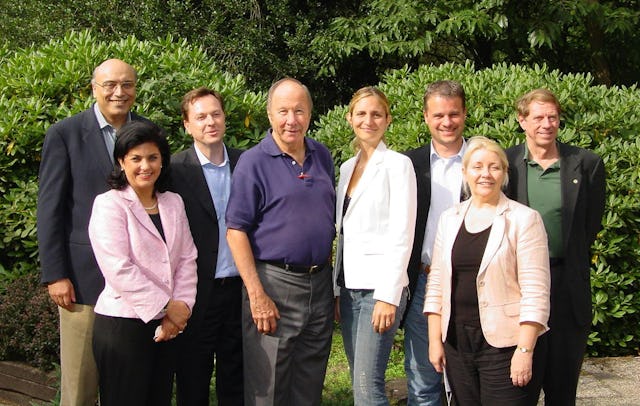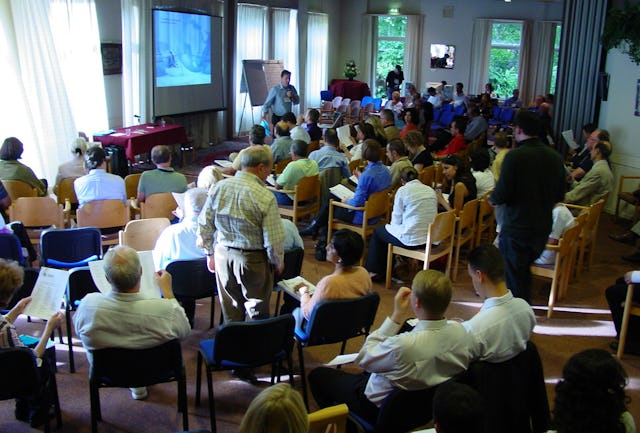Looking beyond short-term profits
GROESBEEK, Netherlands — Participants from 28 countries gathered in this small Dutch town in September to consider how businesses can look beyond short term profits towards moral and spiritual practices that can create meaningful wealth for all.
The 16th annual conference of the European Baha'i Business Forum (EBBF), held 21-24 September 2006, focused on "The Purpose of Business, from Vision to Action."
The program addressed a wide range of topics on that theme. Presentations included "Competing in the New Capitalism," "Redefining Success: Applying Spiritual Values in the Workplace," and the "Ramifications of Global Interdependence."
"The conference was attended by people of different cultures and beliefs with a common interest, and often a passion for the universal values of the Baha'i Faith," said Daniel Truran, Secretary General of EBBF.
Mr. Truran said the presentations made at the conference reflected the efforts of EBBF members to translate those "values" into "tools" that can be used to improve business practices around the world.
He cited, for example, the work of Larry Miller, who gave a presentation on "Competing in the New Capitalism," which is based on his 2006 book of the same title.
Mr. Miller was one of 25 other presenters who offered their views on how businesses can move beyond broad visions to specific actions -- especially as they relate to the ethics of business in the modern context -- that can be implemented Monday morning in the workplace.
Other speakers included Jan Willem Kirpestein, co-founder of the Encounter of World Views foundation; Beppe Robiati, CEO of SCAC Italy; Augusto Lopez-Claros, Chief Economist of the World Economic Forum; and Parag Gupta, of the Schwab Foundation
The conference was characterized by a determined spirit of seeking new and innovative strategies to create wealth for all.
Mr. Gupta, for example, made a presentation highlighting different ways in which the business world can help to effect social change, titled, "Innovative Strategies from Social Entrepreneurs."
He defined social entrepreneurship as business with a heart, (explaning) that social enterprise employs innovative business methods that aim at maximizing social value rather than financial value.
"There are around 3 billion people out there that have not been reached by capital markets," said Mr. Gupta. "Social entrepreneurs are proving capable of penetrating these groups."
"They are doing this by harmonizing issues like 'consumers versus profit.' They take risks in unproven markets and create services and goods for this population that has not been reached yet. Microfinance is an example of this," said Mr. Gupta.
In his presentation, Mr. Miller explained how Baha'i principles offer insights into ethical issues in the workplace. By focusing on spiritual principles, he said, it would be possible to create systems with "just rules to govern behavior."
"The perceived 'evil' of capitalism may be the imbalanced focus on financial capital and ignoring a more holistic understanding of wealth," said Mr. Miller.
Dr. Lopez-Claros explored how more "corporate social responsibility" -- a recognized set of ethical business principles -- can contribute to better competitiveness of increasing global integration.
"Corporate social responsibility makes business sense as it can be an important aid to recruitment and retention," said Dr. Lopez-Claros. "It helps to build reputations that take decades to build up. In crowded marketplaces it provides companies with that 'X Factor' which can separate them from the competition in the minds of consumers."
Many of the participants said that they learned much at the conference.
"This is the fourth annual EBBF conference that I have attended, and it was the best one yet," said Douglas Henck, retired President of Sun Life Financial Asia.
Mr. Henck said that these EBBF meetings are a means for the world to identify a real way for the business sector to contribute meaningfully to progress.
"EBBF is often challenged from both ends of the spectrum;" said Mr. Henck. "From business executives who feel EBBF is too idealistic and non-business professionals who assume business is permanently tainted with evil intentions.
Gary Hogenson, a senior financial officer at the Baha'i World Center, said the annual event reaffirms his view that business is an important part of the progress of world culture.
"Increasingly after attending this conference each year, I walk away with the feeling that I can take pride in calling myself a 'business person.' Meeting with like-minded individuals gives me renewed hope that we as business men and women have a great deal to offer society; and through ethical commerce, avenues of global understanding and the universal advancement of mankind can evolve," said Mr. Hogenson.

